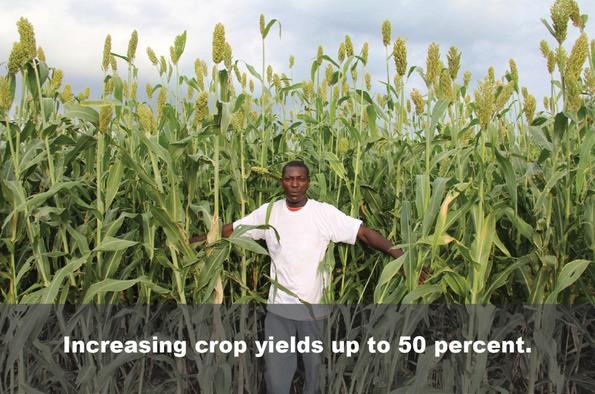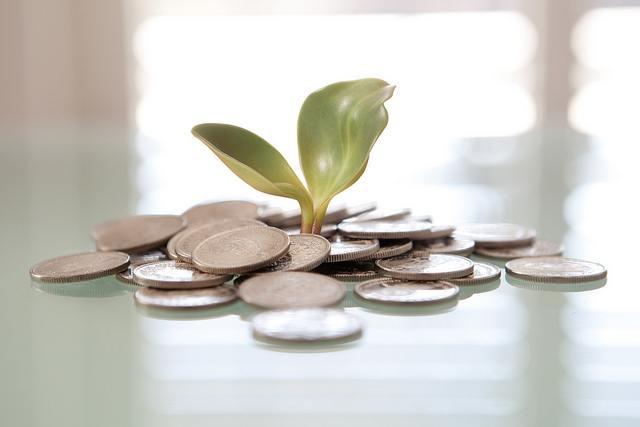Timberland Agroforestry Project Breaks Cycle of Poverty in Haiti


Editor's Note: This is the second post in a two-part series on how sustainable agroforestry is helping to break the cycle of poverty and environmental degradation in Haiti. In case you missed it, you can read the first part here.
An innovative, five-year community agroforesty development project developed and carried out by Timberland, the Smallholder Farmers Alliance (SFA) and Haitian farmers has proven successful. So successful, in fact, that Timberland is considering replicating it in other countries where farmers produce cotton and rubber – the raw materials the company uses to manufacture clothing, footwear and, more recently, tires.
Partnering with experienced local NGOs who know 'the lay of the land,' leading proponents of corporate social and environmental sustainability such as Timberland are helping turn the tide and break the cycle of poverty and environmental resource degradation in Haiti. Through the SFA's community agroforestry development model, Timberland is helping boost agricultural productivity, small farmers' incomes, community well-being, and ecosystems health and sustainability. What's more, it is encouraging NGOs and local communities to come up with sustainable, market-based development solutions.
Moving away from conventional "cash for work" aid programs
The community agroforestry development model SFA and Timberland put into effect in the rural Haitian community of Gonaïves has boosted agricultural output by some 50 percent, lowered input costs and significantly raised net incomes for farmers and their families, SFA co-founder Hugh Locke highlighted.
Since launching the program in 2010, agroforestry co-op membership has shot up over ten-fold to include some 1,000 farm households spread across two co-ops and two satellite sites. Trees are now being planted at a rate of over 1 million per year.
A network of tree nurseries serves as the nucleus of the program, with SFA working with around 24 or so tree species as well as a host of crops important to local farmers, such as sorghum and beans. Timberland and SFA expect to surpass their goal of facilitating the planting of over 5 million trees – self-financed and managed by small-scale farmers – over five years.
Timberland summarized the program's main accomplishments as follows:
“The model has helped 2,000 farmers increase the productivity on their farmlands by more than 50 percent, resulting in increased income and access to education and healthcare for their families and more exports for the country. Timberland will also exceed its goal of planting five million trees in five years, with reforestation efforts protecting the land for years to come.”
Measuring outcomes as opposed to output
Discussing the benefits being realized by Haiti's small-scale farmers, Locke said he prefers to view them from the perspective of outcomes as opposed to output. Feedback from farmers commonly includes them saying that “they are now able to put all their kids through school,” he told 3p.
Small-scale farmers participating in the program, for example, are showing initiative and putting some of the free time they have gained to good use. They have taken it upon themselves to revive “kombit” – a traditional, informal organizational structure associated with communal farming activities, Locke pointed out.
Based on farmers' requests, SFA also helped establish Kay Plante, a microfinance-driven “farmers' house.” The community agricultural co-op shop – the first of its kind in Haiti – offers farmers the opportunity to buy their own supplies and serves as a community resource for sharing information. The working language, moreover, is Creole.
“A smallholder farmer can walk in the door and be addressed in Creole,” Locke highlighted. “Any kind of business operation in Haiti is run entirely in French even though the bulk of the population doesn't speak in French.”
As most small-scale farmers don't know how to read or write, SFA also worked with co-op participants to launch an adult literacy program.
In addition, SFA and Timberland took explicit steps to include women and foster greater gender equality among Haiti's small-scale farmers. The program allows both husband and wife volunteer-farming family members to participate in the program, Locke explained.
Community agroforestry and Timberland's supply chain
Over time, SFA and Timberland have found that program participants become involved to a greater degree and develop a true sense of ownership in the community agroforestry co-op. By their third year of participation, farmers “feel a sense of ownership in the program that cannot be corrupted,” Locke told 3p.
All that said, what's in it for Timberland, and why did they choose SFA from among all the project proposals the company fields?
Fostering greater levels of customer engagement was one strong motivating factor, Margaret Morey-Reuner, Timberland's director of values marketing and strategic partnerships, explained. The company had been considering planting trees for a long time as a way to leverage its tree symbol to connect and engage with customers, she told 3p.
Having formed a partnership with Haiti-born singer/musician Wyclef Jean to help Haitians recover from the 2010 earthquake, Timberland's CEO asked Morey-Reuner and team to see if they could find a prospective project in Haiti. By way of Jean, Timberland's team met SFA's co-founders.
Timberland's "Path of Service" program
SFA's agroforestry project also afforded Timberland the opportunity to engage its own employees and build on the track record of volunteer development work the company has achieved through its “Path of Service” program. Timberland employees have voluntarily accumulated over 1 million hours of community development work and participated in thousands of “Path of Service” projects in countries around the world, Morey-Reuner highlighted.
Another big motivating factor was Timberland's longstanding presence in the neighboring Dominican Republic, which dates back some 30 years. “We have employed successive generations of workers at our factory in the DR, and obviously there's great need [for reforestation and agricultural development] in neighboring Haiti,” Morey-Reuner elaborated.
Finally, Morey-Reuner continued, in the back of Timberland's collective mind was the prospect that the sustainable development project model Locke and Timote came up with could be replicated, scaled and implemented in smallholder farming communities that produce raw materials Timberland uses in its supply chain, such as cotton and rubber.
Sustainably grown rubber and cotton
That's exactly how events have developed. Timberland is now in the early stages of planning to replicate SFA's program in other countries where it sources raw agricultural materials.
“This past November we brought a Timberland brand of tires with a very controlled recycling process to market,” Morey-Reuner noted. Timberland collects the tires, which are produced by its partner Omni United, and recycles into shoes and boots.
Omni and Timberland, she continued, “are seriously considering” employing SFA's community agroforestry development model in countries where natural rubber for their line of tires is sourced.
Similarly, Timberland is working with its parent company, VF Corp., to replicate SFA's community agroforestry development model among its supply chain partners. Replicating the SFA model in countries where Timberland sources cotton would be a natural fit given the fact that VF is a member of the Better Cotton Initiative, Morey-Reuner pointed out.
Both prospective development projects hold the potential to have a direct impact on, and benefit, Timberland's supply chain. They could also bolster the company's strategic corporate social and environmental responsibility efforts.
All these projects, Morey-Reuner pointed out, are firmly rooted in Timberland's fundamental values and business ethics. “Our values are tied to social responsibility,” she stated. “We do our best to give back to the communities and countries in which we do business.”
*Image credits: Smallholder Farmers Alliance
Whose Health is It, Anyway? Learning About Behavior Change Through CSR


By Graham Shelby
If you look at the numbers, Kentucky is a place where people smoke more, weigh more and die sooner than almost anywhere in America. The New York Times Magazine recently concluded that eastern Kentucky in particular, “just might be the hardest place to live in the United States.”
My family is from eastern Kentucky, and I recently visited with some of my colleagues from Humana in Louisville. We went there because those of us who’ve spent our lives in Kentucky know that numbers never tell the whole story, particularly when it comes to people’s health.
To understand what’s really happening, you have to talk to people living actual lives in places like Pineville, Middlesboro and Mt. Vernon, people like the man we’ll call Floyd.
A 65-year old Air Force veteran, Floyd met us at a coffee shop in downtown Corbin. He’s part of a small group of people who offered to talk to us about their experience in the Team Up 4 Health program, which our company sponsors.
Team Up 4 Health is a public health initiative, operated by the global health nonprofit Microclinic International, that uses an approach based on the notion that people facing chronic conditions like obesity, diabetes and hypertension can work together in groups of friends and relatives to make small changes and significantly improve their health. Microclinic International has run other health programs abroad and set up shop in nearby Bell and Rockcastle counties in part because they’re home to a high concentration of people with chronic health problems.
Floyd, a natural storyteller, told us that at first he wasn’t eager to join Team Up 4 Health, which offers free exercise and nutrition classes to groups of people who enroll together to improve their health.
“I’d thought I was healthy,” Floyd says. In fact, he hadn’t been to the doctor for a check-up in “four or five years.” Floyd’s daughter had to cajole him into attending a session, where the program provided a health screening that got Floyd’s attention. “Turns out,” he says, “I should’ve died six months before that meeting.”
Since joining Team Up 4 Health, he’s followed the program, making a series of small, incremental changes -- eating better, choosing fruits for snacks, walking more. He’s lost weight. He has more energy. “It’s changed my life for the better.”
Humana’s interest in Team Up 4 Health centers in part on the changing dynamics of American health care. In both social and economic terms, greater health for people like Floyd is everyone’s interest – insurers, the community, and the patient himself and his family. If Floyd had ended his story there, we would have been satisfied that we’d heard all we need to know. But Floyd had more to say.
“Of course, I am still smoking,” he says. He has for most of his life. In discussing it, he’s alternately contrite and defiant. He knows it’s bad, knows he’s setting a poor example for his kids and grandkids. He also declares, “If my doctor told me, ‘Give up cigarettes, or in six months, you’ll be dead,’ I’d tell him, ‘Well, then, let’s make the funeral arrangements right now.’”
This makes me wince, in part because the sentiment is so familiar. Deep within the character of this region, if not of America itself, lies an ornery streak. Floyd knows that tobacco hurts his health, yes, but it’s still his health. His life.
What Floyd makes clear, intentionally or not, is that changing health habits is only partly about disseminating information about carbohydrates or sodium content. It’s perhaps just as much about identity. Getting Floyd to give up smoking isn’t just about changing what he does; in some sense, it’s about changing who he is, or at least how he sees himself.
What I want to say to Floyd, but don’t, is the same idea I often struggle to remind myself: that my identity as a human being, or a man, is not so fragile that it can be either lost or salvaged by anything that comes from a cigarette pack or a snack machine.
Given the complex nature of culture, health and identity, the results Team Up 4 Health have achieved here look even more impressive. In the initial two-year pilot in Bell County, 95 percent of participants who completed the program reported improved numbers in one of the program’s key metrics, like waist circumference, BMI or blood glucose.
I notice Floyd’s smoking comment earns him a withering look from the woman sitting next to him in the coffee shop. She’s part of his Team Up 4 Health group. They earn points and prizes for their team’s ability to meet health goals. Her success is tied to his. In a way, so is ours as a society. The sicker we are as a people, the harder it is for our health care system to take care of us, and the greater the drag on the respective economies of towns, states and the nation.
In the weeks since that visit, I’ve thought about Floyd often and hope that he takes care of himself. Like all of us, one day, all that will be left of Floyd will be those kids and grandkids and their memories of him. When that happens, it’d be nice if one of the Floyd stories they tell goes something like this:
“Remember how he used to eat everything and smoke all the time?”
“Yeah. He really turned that around, though, didn’t he?”
“Mm-hmm, it was something to see.”
Image credit: Team Up 4 Health via Facebook
Graham Shelby is a communications consultant for Humana. He also writes about personal health and fitness at blog213.com
Visions of 2030


Next week I will be attending Abu Dhabi Sustainability Week in the United Arab Emirates as the winner of the Masdar Blogging Competition. My winning essay described a vision of my city, Rochester, New York, in the year 2030. The conference, which will include the World Future Energy Summit, also hosts numerous talks, displays and presentations featuring sustainable options for the future.
In preparation, I read this post on GreenBiz in which the author interviewed a number of leading thinkers in various fields about their thoughts on what 2030 might bring.
Not surprisingly, each focused on his or her own corner of the world. For example, Darrel Smith of Microsoft talked about the importance of cloud infrastructure and the kinds of services that could grow from that. Energy consultant Matthew Norden of MNL Partners foresees a nuclear power renaissance.
That view is shared by David Friedberg, CEO of the Climate Corp., who is a believer in liquid fluoride thorium reactors (LFTR), a compact and purportedly safer nuclear technology that enjoys a cult-like following, at least among physicists. Friedberg acknowledges that LFTR won’t be commercially ready by 2030, but he expects to see progress all the same. Friedberg is also hoping to see room temperature superconducting magnets, as well as automated agriculture and a substantial increase in vegetarianism. His company’s main focus is on agricultural technology.
Speaking of agriculture, Paul Hawken, author and visionary, who always has something interesting to say, mentions only one thing on his list: pasture cropping, something I’d not heard of. It turns out pasture cropping is a way of bringing the idea of perennial crops into modern agriculture, an idea that Wes Jackson has been working on at the Land Institute for over 30 years.
Perennial agriculture entails using more perennial plants as a food source, which can significantly reduce the impact as compared with the annual monoculture practiced today. For starters, by not plowing under a crop each year and planting new seeds, this saves a great deal of topsoil from being lost. Additionally, perennials tend to develop deep root systems which makes them more drought tolerant. Furthermore, when plant species interact synergistically as they do in native prairie (which Jackson uses as his model), there is reduced need for fertilizers or pesticides. Jackson has been developing a set of four perennials that will interact in a way that allows them to grow together, resulting in the production of one or more useful grains.
Pasture cropping takes a slightly different approach. Here, as the name suggests, the crops are combined with the pasture plants in an integrated manner that increases productivity. Winter-growing cereal crops are planted right alongside summer-pasturing crops, which allows for year-round growth and fertilizing of the ground by farm animals.
Of course, if David Friedberg gets his way, there will be more vegetarians and less need for pasturing. In Australia, where pasture cropping has been in use since the 1990s, it is often used in conjunction with sheep, which could potentially could be raised for wool alone.
Tensie Whelan, president of the Rainforest Alliance, is all about addressing the roots of deforestation. Recognizing that some level of deforestation is inevitable, she has set the goal for net-zero deforestation.
Several others spoke of the continuing boom in solar and the expanded use of data to improve the efficiency and effectiveness of various infrastructure systems like transportation and buildings.
It should be interesting to see how these ideas compare with those that come up in Abu Dhabi.
Image credit: Dany Eid: Flickr Creative Commons
The Smart Home Nudges Manufacturers Toward Sustainability


By Jennifer Tuohy
From lock manufacturers to heating and air conditioning companies, the smart home space is disrupting legacy industries. Big names in consumer products with decades of experience behind them have been caught off-guard by Kickstarter-powered startups and Silicon Valley CEOs.
The Nest Learning Thermostat, which debuted in 2011, was the first product to show what a nimble young company with high-tech brainpower behind it (in this case, two of Apple's bright minds) could do to a space that many thought was set in stone. It took a little under five years, but the legacy companies are catching up — Honeywell launched its Nest alternative, the Lyric, late last year.
Is it too little, too late? Not at all. Don't discount benefit of the decades of experience that legacy companies like Honeywell bring to the table. Bear in mind, Honeywell actually had a round thermostat first, in 1953.
As I discussed in my last article for Triple Pundit, this type of disruption drives development by forcing the big companies back to the drawing board to hopefully come up with even better products — ones that will save consumers even more money, use even less energy and lead us toward greater sustainability. Nowhere is this more relevant right now than in the smart home space.
Take Rheem, the 90-year-old water heater manufacturing company, for example. It debuted a Wi-Fi Water Heater Module last June — the first in the space. The EcoNet Module allows homeowners to take total control of their water heater from anywhere. Via a smartphone app, homeowners can set the temperature of their water heater and access features such as leak detection, service diagnostics and system status. The water heater can also be set to vacation mode, so it's not heating and reheating water when no one is home to use it, saving energy and money. There is a Kickstarter project working on a similar product, but if you are a consumer trying to decide between the two models, which are you going to choose: the one with almost a century of experience behind it or the one with seven years?
This is where the legacy manufacturers can shine in the emerging smart home space. When a company can be brave enough (or scared enough) to go back to the drawing board and rethink its products from the ground up, casting off the baggage that comes with large infrastructure and a few decades of a set way of doing things, there's no reason it can't produce a product to compete with (or in many cases, outshine) these emerging alternatives.
"These fresh young companies often have interesting takes on something that's been around for a while, without the baggage, perhaps, of past projects that haven't gone well," says Matt McGovren, marketing director of Wink, a smart home control system working with manufacturers to bring traditional products into the smart home. "These companies don't have the distribution channels to reach the mass consumer—the everyday person. The legacy companies have the channels to do that and they understand what's at stake for their business."
We are clearly just at the beginning of the smart home revolution. McGovren predicts that in the next 12 months we'll continue to see more and more products becoming connected — primarily things that you may have never thought about the benefits of connecting and that have been in our homes for decades.
"I love the example of the water heater," he offers. "You can get an alert if it's leaking, so that saves you time and money and you can also adjust your water heater's temperature—just like you can adjust your thermostat. People haven't done it before because it's hard to do, but this makes it easier. It's something people don't really think about because it's in a closet, but once you connect it, that opens up four or five use cases you'd never even thought about."
With this control comes the ability to strive toward a higher level of sustainability in the home. After HVAC, heating water accounts for the largest portion of an average home's energy use. Infinitesimal control over your hot water heater could have a significant impact on reducing water and energy use in a home, and as more and more of our home becomes controllable, the possibilities for more and more energy savings escalate.
Wink itself is an interesting model. Essentially a software company with a hardware hub that helps homeowners connect their connected devices, Wink has built its success on being the company that talks to all the other companies -- most notably, the big legacy companies.
Wink has worked hard since its launch last year to integrate with big name brands like GE, Honeywell, Kwikset, Kidde, Schlage and Rheem — companies with nearly 600 years' worth of experience in specific consumer products between them.
"We're partnering with the lead brands," McGovren said. "And it's not just a partnership in name — we actually work with them directly to work out features, as a team. That type of partnership hasn't really been done before."
An inclusive approach to the smart home is arguably the only viable path to success. "We're starting to see companies realize it's better for everybody if we work together," McGovren said. "What happened in the market in 2014 was the widespread realization that everybody needs to work together. It's no longer who is going to 'win' the smart home. That's like asking 'Who is going to win the Internet?' Nobody is going to win. It's a huge space. Instead, we need to think, 'How do people really want to live?'"
This type of collaboration between manufacturers and technology is a bright new world and one that, if it succeeds, could see the smart home step up to the next level, bringing with it increased control and sustainability in American households.
Jennifer Tuohy writes about smart homes, energy efficiency and appliances for Home Depot. You can view the smart home water heaters Jennifer discusses in her article on the Home Depot website.
Benefit Corporation Laws -- California vs. Delaware. It's All In the Details


Editor's Note: This is the second post in a two-part series that highlights notable differences in benefit corporation law in two influential states, Delaware and California. In case you missed it, you can read the first post here.
By Jonathan Storper
Benefit corporation law has been enacted in 19 states, and 10 other states have introduced the legislation.
Delaware is of particular significance because it is the recognized leader in corporate law, and over half of all public companies are domiciled there. California is the largest state and has provided the country with the benefit corporation model legislation.
In the first installment of this series, we explored the three distinct attributes of a benefit corporation and how these differ in the two states. Now, let's get down to the details*.
*Citations to the CCC refer to the California Corporations Code and DGCL refers to the Delaware General Corporation Law.
Incorporating, merging or converting a benefit corporation
The California articles of incorporation must state that the corporation is a benefit corporation and any optional specific public purposes. CCC 14602. Stock certificates must also identify the corporation as a benefit corporation. CCC 14631.
By contrast, in Delaware, the certificate of incorporation must specify the required specific public benefit purpose(s) and any optional provisions noted above (which are built into the California statute). Provisions may also be included in the certificate of incorporation that disinterested decisions by directors will not constitute an act or omission not in good faith or breach of the duty of loyalty for monetary damages or provide an indemnification right to directors.
In Delaware, stock certificates and notices to stockholders must note that the company is a benefit corporation. Conversion or merger into or out of a California benefit corporation requires at least a two-thirds vote of the outstanding shares. CCC 14603 and 14604. Dissenters' rights are available for those not voting in favor of the California conversion or merger. CCC 14604(d).
In Delaware, a 90-percent vote is required to convert or merge into a benefit corporation. DGCL 363(a). Those not voting to convert or merge into, or merge out of, a benefit corporation are entitled to appraisal rights, that is, the right to have their shares purchased for fair market value. A two-thirds vote is required to convert from, or merge out of, a benefit corporation. There are no appraisal rights converting from a benefit corporation. DGCL 363(b) and (c).
Enforcement
In California, if the corporation fails to pursue its public benefit purpose(s), assess its performance or issue the benefit report, the shareholders may bring an action in court to force the corporation to do so. No monetary damages are available in a derivative action, though the court may order reimbursement of attorneys' fees. CCC 14623.
DGCL 367 authorizes stockholders to sue derivatively to enforce the duties of directors, but only by stockholders individually or collectively who own at least 2 percent of the corporation's outstanding shares or the lesser of 2 percent of the outstanding shares with a market value of at least $2 million where the corporation is listed on a national securities exchange. DGCL 367.
Director's duties
In California, the directors of benefit corporations must perform their duties in good faith in a manner the director believes to be in the best interests of the corporation and with that care, including reasonable inquiry, as an ordinary prudent person in a like position would use under similar circumstances. CCC 14620(a).
Directors must consider the impacts of any action on not only the shareholders but also on employees, customers, the community, the environment, short- or long-term interests of the corporation, and the ability of the corporation to accomplish its public benefit purpose. CCC 14620(b).
In discharging those duties, directors are not required to give priority to any particular factor or person unless the corporation so stated in its articles. CCC 14620(d). Directors of foreign corporations subject to CCC 2115 are not be subject to CCC 309 (director's fiduciary duties) and instead are subject to the duties under the laws of its jurisdiction of incorporation if those duties are "similar to" those prescribed by the California Benefit Corporation law. CCC 14620(j). The model legislation upon which most states premise their benefit corporation law would likely qualify under this definition, but with Delaware, this is less clear, though still arguably so.
DGCL 365(a) provides that the board of directors must manage the corporation in a manner that balances the "pecuniary interests of the stockholders, the best interests of those materially affected by the corporation's conduct, and the specific public benefit or public benefits" identified by the corporation.
Directors satisfy these modified duties "if such director's decision is both informed and disinterested and not such that no person of ordinary, sound judgment would approve." DGCL 365(a). In both states, directors owe their duty to shareholders and not other stakeholders. CCC 14620(i); DGCL 365(b).
Tax and contract bid preferences
Benefit corporations, wherever their jurisdiction of incorporation, may elect to be a subchapter "C" or an "S" corporation for tax purposes. The city of San Francisco offers a city contract bidding preference to benefit corporations of 4 percent.
The press release by the ordinance's sponsor announcing the bid preference states that San Francisco has enacted the ordinance as a way to demonstrate the city's "commitment to sustainability, economic innovation, and social entrepreneurialism." Philadelphia offers a tax benefit to these corporations as well. It remains to be seen if other jurisdictions will offer incentives to the benefit corporation.
Conclusion
The Delaware and California benefit corporation models embrace the principles of purpose, accountability and transparency in similar but different ways. Legal counsel should understand these different and nuanced approaches in order to assist new and ongoing enterprises with the best approach for their business. Each form provides a corporate structure that paves the way for a more sustainable economy where there is no long-term tradeoff between purpose and profit.
Image credit: Flickr/Tax Credits
Jonathan Storper is a partner in Hanson Bridgett LLP's San Francisco office.
*The opinions expressed are those of the author(s) and do not necessarily reflect the views of the firm, its clients, or Portfolio Media Inc., or any of its or their respective affiliates. This article is for general information purposes and is not intended to be and should not be taken as legal advice.
Is Wendy’s Dropping Soda From Its Kid’s Menu?


One more fast food chain may be dropping soda from its kid’s menus. Although Wendy’s has yet to confirm it, the Center for Science in the Public Interest (CSPI) reports that the fast food chain is removing soda as the default option in its kid’s meals. The move is praised by CSPI, MomsRising.org and the Interfaith Center on Corporate Responsibility (ICCR).
McDonald’s made a similar announcement in 2013, and its policy goes into effect this year. Subway, Chipotle, Arby’s and Panera Bread don’t include soda in their kid’s meals either. The ICCR filed a shareholder resolution last year with Wendy’s, but withdrew it when the company agreed to consider removing sodas from the kid’s menu.
"While parents bear most of the responsibility for feeding their children well, restaurant chains also need to do their part," said CSPI senior nutrition policy counsel, Jessica Almy. "Restaurants should not be setting parents up for a fight by bundling soda with meal options designed for kids. Wendy's is taking a responsible step forward that will improve children's health and make it easier for parents to make healthy choices for their children.""Ensuring that our children can make healthy choices is an important part of raising them," said MomsRising executive director and CEO, Kristin Rowe-Finkbeiner. "When restaurants offer up sugary drinks as the default choice, it undermines those efforts. MomsRising and its members are delighted that Wendy's is now supporting parents in encouraging children to make healthy food choices."
The link between soda consumption and obesity
More than a third of Americans are obese, and obesity-related conditions like heart attacks and diabetes are some of the leading causes of preventable death. The U.S. spends an estimated $190 billion a year treating obesity-related health conditions.
Sugary soft drinks are a prime culprit: Although it goes down easy, a 20-ounce soda has 15 to 18 teaspoons of sugar and 240 calories. A 64-ounce soda might have up to 700 calories.
Studies have directly linked obesity to soda consumption. One study published in the Lancet specifically linked soda consumption to childhood obesity. Researchers studied 548 children, ranging in from 11 to 17 years old, in four Massachusetts communities for 19 months. What they found is that kids who drank sodas had larger body mass index (BMI) scores and higher obesity rates. In the words of the study, “Consumption of sugar-sweetened drinks is associated with obesity in children.”
Image credit: omgponies2
Expelliarmus! Harry Potter chocolate goes Fair Trade


Warner Bros, the studio behind the “Harry Potter” movies, is moving forward with plans to make all Harry Potter chocolate sold at Warner Bros outlets and through their licensed partners 100% UTZ or Fair Trade. The announcement in the US follows a four-year, fan-led effort by the Harry Potter Alliance.
The Harry Potter Alliance (HPA) originally launched the campaign in 2010 when Warner Bros’ chocolate supplier, Behr’s Chocolate, received an “F” for its supply chain from an independent report. Fans sent cease and desist letters and “muggle howlers” encouraging the studio to ensure its licensees were not using child slave labour to produce the chocolate being sold in Harry Potter’s name.
The HPA even started marketing and selling its own Fair Trade Chocolate Frogs and last year Harry Potter author J.K. Rowling took up the cause.
Warner Bros. has now pledged to make all of its Harry Potter chocolate products UTZ or Fair Trade by the end of 2015.
HPA co-founder Andrew Slack said of the breakthrough: “Albus Dumbledore told the students of Hogwarts that there are times where we must choose between 'what is right and what is easy.' Warner Bros has chosen to do the right thing and Harry Potter fans everywhere should take pride knowing that because of their efforts, the chocolate sourcing for Harry Potter products will match the values of the book series.”
Fairtrade Foundation turns spotlight on 'clean gold'


Following its success with tea, coffee and bananas, the Fairtrade Foundation is looking to further its engagement with the gold industry.
"Not enough people know about Fairtrade gold. By choosing it, you can create a better life for miners and their communities," said Amy Ross, Fairtrade Gold Project Manager at the launch of the organisation's new 'I Do' campaign, encouraging couples to choose Fairtrade gold rings this Valentine's Day.
A recent survey by Cred Jewellery found that only 16% of people said they were familiar with Fairtrade gold as opposed to 64% who were familiar with Fairtrade tea or coffee.
The Fairtrade Foundation estimates that £1m in Fairtrade Premium could be generated if 50,000 couples chose Fairtrade gold wedding rings.
The campaign launch coincides with the Foundation's publication of a new Industry Briefing to explain the complexities behind the gold mining industry and its new Standard for Gold & Precious Metals to help protect miners and their familiar against poverty and exploitation, revising the standard first introduced in 2011.
For the full story see the February issue of Ethical Performance.
Picture credit: Hidden Ring, Cox & Power
BITC launches 3-year action plan to tackle water management


Business leaders are calling on business to tackle water issues in the UK. With the backing of the government, Business in the Community (BITC) has brought together water companies, other businesses, and key stakeholders to work collaboratively on the challenges, and encourage other businesses to take action on water to help build a fairer society and more sustainable future.
The BITC Water Taskforce, chaired by United Utilities ceo, Steve Mogford, is calling on all UK businesses – large and small, from every sector, be they at the beginning of their journey or further along – to consider their relationship with water and take action to improve their resilience to the risk of periods of too much and too little water.
To mark the start of a three year plan of action, the group has launched a report ‘Securing the Resources for Future Prosperity’, which highlights the water challenges faced in the UK, reasons why businesses should take action and what they need to do. The report uncovers many stories of how businesses are already rising to the challenge.
Gudrun Cartwright, head of innovation and partnerships, BITC said: “Water management should be part of all sustainable business strategies. Rising sea levels and changes in rainfall patterns are just the beginning of an increase in flooding and drought in the UK. There is a clear and urgent need for UK businesses to act now and respond to water challenges."
For the full story see the February issue of Ethical Performance.
Will the Chevrolet Bolt EV Push Electric Vehicles to the Mainstream?


Concept cars at automobile shows generally offer the following: great opps for selfies, dreams over driving a vehicle that will never exist and, of course, the occasional eye roll. But this week at the North American International Auto Show (NAIAS) in Detroit, one concept car dazzled because of its design and its potential to transform the automobile industry: General Motors' (GM) Chevrolet Bolt EV, which could hit the market as soon as 2017.
The Bolt is a huge step closer toward the holy grail of electric vehicles (EVs): affordability and sustainability — the latter of which in this case is defined by range, the current bugaboo of most EVs. Sure, we love Tesla for its phenomenal design and range of 265 miles between charges. Unfortunately, the sticker price, which ranges between $70,000 and $90,000, is out of range of most of our budgets. GM’s Chevy Spark EV could be a car for the rest of us, with a price of about $20,000 after federal rebates. But with a range of about 82 miles, it fails to snag interest from most consumers due to that massive hurdle: “range anxiety.”
This electric car, however, hits a sweet spot. On Monday during its introduction at Cobo Hall in Detroit, GM executives, including CEO Mary Barra, touted its $30,000 price after federal tax incentives, along with its promised range of 200 miles. Considering the average commute per day hovers around 50 miles, this four-door hatchback could snare plenty of interest in the coming decade.
The Bolt is riding the coattails of its cousin, GM’s Chevy Volt, which is enjoying increased success and praise despite the ongoing naysaying about the future of plug-in electric cars and the fallout of batteries catching fire not so long ago. But as GM representatives repeatedly reminded me during my time in Detroit, Chevy Volt owners rank as the most satisfied automobile owners across the board.
Their obsession with driving hundreds of miles without having to fill up, affection for the car’s design and enthusiasm over how the car performs on the road have created a cult following any brand would kill for. The 2016 Volt promises even more, including an overall lighter car, quieter ride, that all-important fifth seat in the rear and the ability to drive 1,000 miles between gasoline fill-ups. If GM can deliver on these new features, that goodwill can carry over to the future release of the Bolt.
The Bolt’s range and price could deliver a one-two punch that entrench EVs into the mainstream. True, current cheap gas prices offer somewhat of a threat: Sales of trucks, after a decade of stagnation, are surging. But the stubborn truth is that oil prices will spike again; we just don't know when. And one reason why Volt owners are so enthusiastic about their cars ties in to our current busy lives, real or perceived — few of us enjoy the task of filling up at the gasoline station. Add the fact millennials are ever keener on having a car that does not have the conventional internal combustion engine (and avoiding cars, period, if they can), and we see more reasons why GM could have a potential goal mine in the Bolt.
Long vilified for its burial of the EV1, and viewed suspiciously for its venture in electrified cars, GM’s latest move signals that the automakers are getting it. An EV with mass appeal could transform the automobile industry — and fluster the oil companies in the process.
Image credit: Leon Kaye
Based in California, Leon Kaye has also been featured in The Guardian, Clean Technica, Sustainable Brands, Earth911, Inhabitat, Architect Magazine and Wired.com. He shares his thoughts on his own site, GreenGoPost.com.
Disclosure: GM covered the cost of Leon Kaye’s attendance at NAIAS.